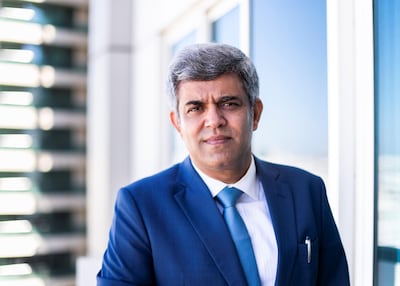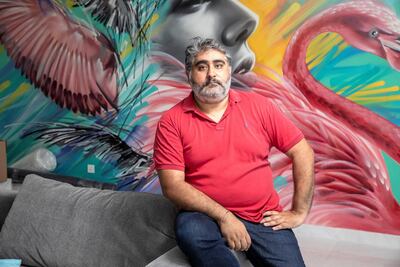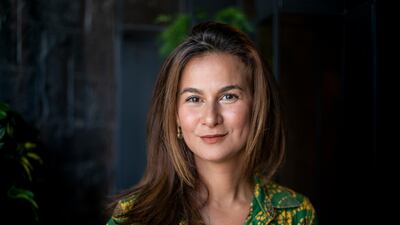Hindsight is 20/20, as the saying goes. That's reason enough to get UAE residents to look back on their savings and investments, and it turns out there are plenty of regrets all round – from getting started late to trusting financial advisers.
Some of that comes with living in the UAE, says financial expert Steve Cronin, founder of DeadSimpleSaving.com, an independent community for financial education. “Saving and investing from the UAE is more complicated than in a major investing hub like the UK or the US,” Mr Cronin says. “People feel they don’t have the time to learn how to invest or review their spending and fear making a mistake. Then, they put their trust in other people [such as their partner or an adviser], who turn out to be not so great at investing after all.”
Black swan events such as the coronavirus pandemic can cause us to reconsider past decisions. More than half of all respondents across all generations in an April survey of 2,008 Americans by the personal finance site MagnifyMoney regretted some of their past investments following the coronavirus pandemic.
From his experience, Mr Cronin says expats in the UAE are either not saving enough for their retirement or have invested in long-term savings plans promoted by financial advisers that won’t grow enough to support them in retirement.
He suggests each of us should learn about finance, beginning with a Google search. “With a week of evening reading to learn about financial independence, you can easily take back control of your finances and invest by yourself,” Mr Cronin says.
Below, UAE residents share their investment regrets and explain what they learnt.
Start planning your pension early
As a lifestyle and nutrition coach, Debbie Rogers helps people get the health results they want through online coaching that looks at habits, lifestyle and mindset changes. Along the way, she is also evaluating her own choices in other areas of her life.
After recently celebrating her 54th birthday, the British national started thinking about her pension position. “While I don’t feel much older, I have to accept I am getting closer to a pensionable age,” she says.
Like many expats in Dubai, the founder of The Rebel Nutrition Coach initially came out on a short-term contract. A three-month assignment turned into a 12-year adventure. While Ms Rogers was a member of company pension schemes in the UK, often contributing more than the minimum, that changed when she transferred to a local UAE contract.
“I’m a person of few regrets but I guess in hindsight, I should have thought about my pension in more detail when I arrived in Dubai rather than leaving it until recently to review,” she says. She is now researching what pension provisions she has frozen in the UK and what options are available to her as a self-employed professional.
Ms Rogers owns a property in the UK, as well as shares in several companies. However, she has so far been unclear about what these investments mean in terms of a pension pay-out – an avoidable situation that could have been rectified with a structured approach early on.
“I would tell my younger self about the benefits of a compound approach to investments, that the earlier you start, the more likely your assets will build up over time, and to keep up a pension even as an expat. Hindsight is great!”

Don’t trust sales projections
Vilas Bakshi has had two radically different experiences with the same financial services company. The senior construction executive took out a 15-year insurance policy in 2004 but as of early October, his investment reflected a 23 per cent loss.
Although he was told his investment would not appreciate over the first three to five years because of costs and charges (a red flag for any investor), Mr Bakshi was shown financial projections demonstrating a significant increase in value over the policy term – subject to assumptions such as market growth of 6 or 7 per cent. “But the plan I bought remains in the red even after the 15-year period,” says the Indian national.
The equity-linked scheme invested in different markets, including US blue chip funds, money markets and the global energy sector. When Mr Bakshi flagged the poor performance, changes were suggested and excuses made about market dynamics, such as the financial crisis of 2008-2009. “If the fund remains in the red even 15 years later, why should the company earn anything?”
Mr Bakshi says the experience taught him a few hard lessons. “As opposed to India, I don’t have a strong understanding of global markets. So, I depended on the adviser's expertise. That is my mistake. I should have developed my understanding.”
Mr Bakshi suggests buying insurance products independently of any equity linkages. “Consider the plan as a cost because you receive protection. You’ll pay a lot less and can invest the rest separately.”
Mr Bakshi also bought a systematic investment plan in US dollars from the same supplier in 2016. “Three-and-a-half years later, the fund is already 16 per cent plus,” he says. “I’ve had similar results consistently from the Indian market since 2002.”
SIPs require putting away small amounts of money regularly. They usually work out well because the phenomenon of dollar cost averaging sees prices rationalise over time. “You can’t go wrong with SIPs because everything evens out.”
Consider exit conditions carefully
The lack of pension schemes for expatriates in the UAE prompted Anissa Boulahya to buy an apartment in Algeria as a way of saving up for her old age. However, the French national, who is originally from the North African country, has been unable to sell it and repatriate the money.
Ms Boulahya, a corporate director at corporate services provider ClearView Group and founder of Ashante Design, an Africa-inspired corporate gifting and events company, sent all her savings to Algeria to buy the apartment, which cost €230,000 ($278,808). “That was in April 2017. I would like to sell this apartment now because I want to invest the proceeds into Ashante Design,” she explains. “However, I cannot sell the apartment because I cannot get the proceeds out of Algeria, according to its currency and capital outflows policy.”
The experience taught the Dubai resident to think about exit mechanisms on all her investments. “I have learnt to keep my money in a country with free capital circulation,” she says.
Ms Boulahya made subsequent real estate investments in France, where she earns net returns of 6 per cent per year, and where she could take out a mortgage. “Real estate is a steady long-term investment in France. Apart from a down payment of 20 per cent, subsequent outflows are covered by rental income, and an agency handles everything.
“I invest, forget about it and await the full amortisation of the mortgage to increase my earnings with rental income. The low cost of borrowing money these days makes it worth it for everyone who needs to plan for their retirement.”
Learn to make the most of a bad situation
Vinayak Mahtani has experienced the trauma of seeing his investment depreciate but has transformed that failure into a successful business. Not everyone is so lucky.
Mr Mahtani, an Indian national, paid Dh3 million for a one-bedroom apartment as a weekend getaway on the Palm Jumeirah when he moved to Dubai in 2012. “I was fresh off the boat and thought it would be a great investment. But its value has nosedived and maintenance fees are extremely high. It is now worth half of what we paid,” he says.

When his family didn’t use the apartment as intended, Mr Mahtani rented it out for two years but felt the return on his investment was not high enough. Inspired by the success of Airbnb, he and his wife launched a holiday rentals business, bnbme Holiday Homes by Hoteliers. He is now chief executive of the new company.
“We are now one of the most preferred luxury vacation rental management companies in Dubai. Today, we manage a property portfolio of holiday homes of over $100 million. So, in the end, the investment resulted in much higher returns.”
He could make the switch because his core business was hotel supplies and he understood the different aspects of the region’s hospitality industry.
“You need to learn to pivot in life to make the most of what you have. I could have settled for a long-term lease, but the short-term income now earns me double what I would have earned, and I have a new business. With rentals falling thanks to the coronavirus pandemic, our business is on the up because we offer landlords so much more.”

